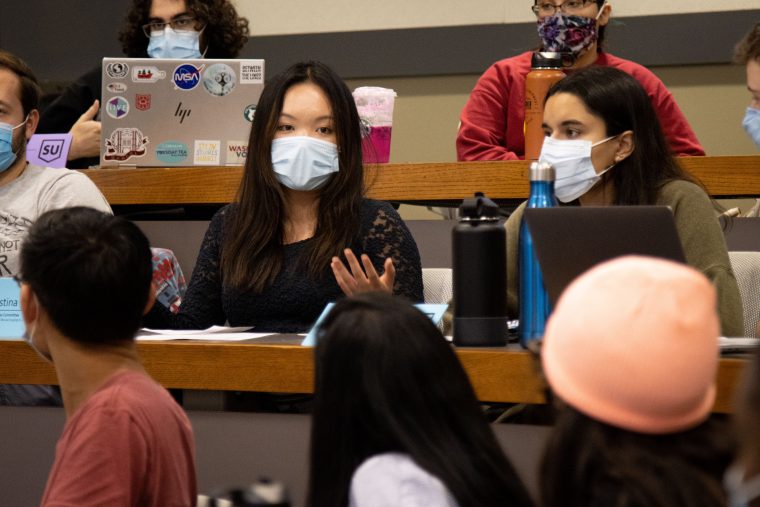News
Narasimhan sworn in to Treasury after Constitutional Council decision reverses disqualification

Students discuss funding appeals at a November Treasury meeting. (Photo by Curran Neenan/Student Life)
Treasury representative Mishka Narasimhan was sworn in to her position Jan. 21, after a decision from Student Union’s Constitutional Council ruled that the process for her disqualification was unconstitutional.
Narasimhan, who was initially disqualified in December due to a late expenditure report, submitted an interpretation request to the Constitutional Council on Nov. 30. Narasimhan argued in the request that post-election disqualifications were unconstitutional and that election commissioner sophomore Bonnie Segel had shown a personal bias against Narasimhan and failed to follow the proper procedure for disqualification.
The Council’s majority decision found that Segel violated SU constitutional procedure by not consulting with members of the Election Commission, making the disqualification invalid. However, it also ruled that post-election disqualifications are constitutional and do not infringe on the rights of constituents, and did not rule on whether bias was present.
Segel did consult two of the three election commission members about the disqualification on the evening of Nov. 30, but had already sent the email disqualifying Narasimhan over four hours earlier, without consulting or notifying commission members, Constitutional Council found.
“In order for a candidate to be penalized in accordance with the Constitution and Statutes, the decision must be made by the Election Commission as a whole, not just the Election Commissioner,” the majority decision read. “In this instance, the petitioner was disqualified by a decision made by the Election Commissioner without any legitimate involvement from the Election Commission.”
Narasimhan had argued that disqualification of candidates after an election has taken place infringes on students’ right to vote.
The Council’s majority opinion pushed back against this argument, stating that post-election disqualifications in plurality elections like last fall’s Treasury race are constitutional. In the case of a potential student who voted for a candidate who was then disqualified, the majority decision stated “the integrity of [that student’s] vote was upheld. One of their candidates just had to be removed.”
The Council also argued that such a decision would create an “arbitrary and avoidable loophole in the enforcement of election rules,” by only allowing the Election Commission to enforce certain rules before election day.
“It is entirely plausible a candidate could flagrantly break one or multiple rules, hide it until after the election, and would receive a get-out-of-jail-free card from the Election Commission,” the decision read. The Council then determined that the Election Commission loses enforcement capabilities only after candidates are officially sworn in.
Still, in a concurring opinion, Associate Justice Elijah Wiesman critiqued the majority’s stance on post-election disqualifications, arguing that it “opens a pandora’s box by allowing partial infringements on constitutional rights.”
“Central to the right to vote is the understanding that the right extends not only to the ability to cast a vote, but also to have that vote counted,” Wiesman wrote. “There is no conception of post-election disqualifications that comports with this understanding of a right to vote.”
Associate Justice Kevin Wang also submitted a concurring opinion critical of the majority’s decision not to rule on Narasimhan’s allegations of bias. He concluded that it was impossible to be certain that Segel acted in a biased manner, but questioned the proportionality of Narasimhan’s punishment relative to the infraction of submitting late paperwork.
“At best, the Commissioner’s decision to disqualify the petitioner was the result of being too lazy or too indifferent to think of a punishment that is actually fair,” Wang wrote. “At worst, it is a constitutional violation for allowing personal biases to interfere with an election outcome.”
The majority opinion characterized the question of bias in Narasimhan’s disqualification as “irrelevant,” since its ruling on Segel’s failure to follow constitutional procedure meant that Narsimhan would be sworn in either way.
Narasimhan and Segel did not respond to Student Life’s requests for comment.
Ted Moskal contributed reporting.
